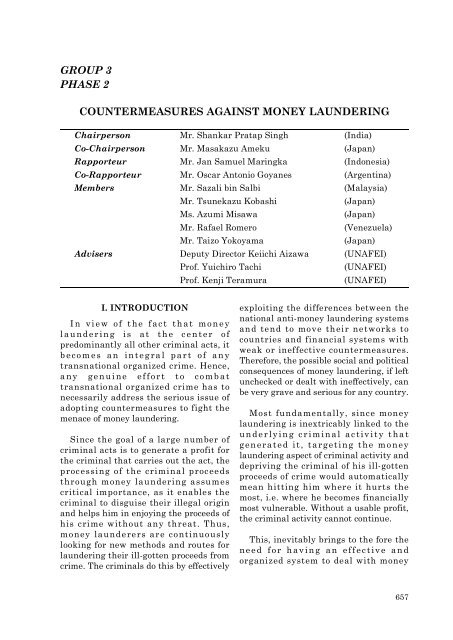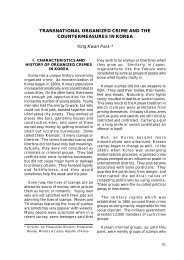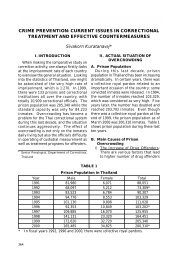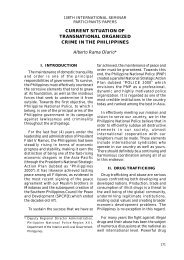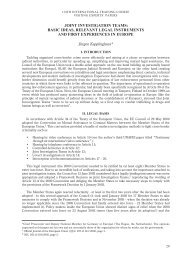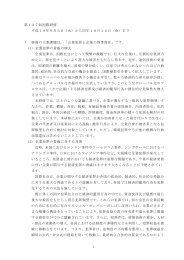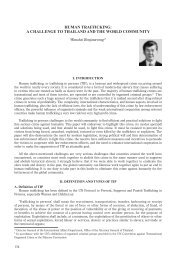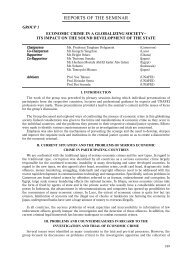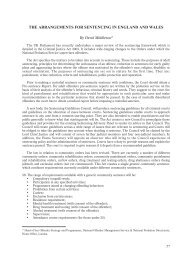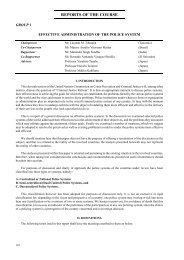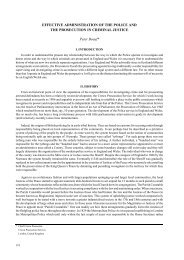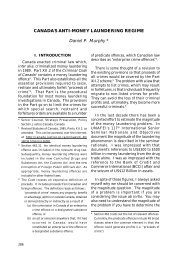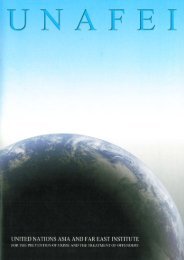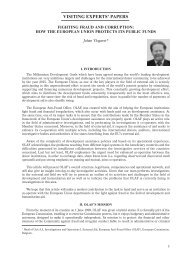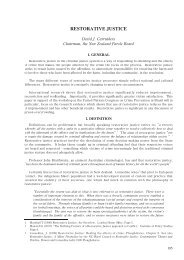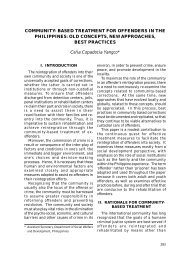group 3 phase 2 countermeasures against money laundering
group 3 phase 2 countermeasures against money laundering
group 3 phase 2 countermeasures against money laundering
You also want an ePaper? Increase the reach of your titles
YUMPU automatically turns print PDFs into web optimized ePapers that Google loves.
GROUP 3<br />
PHASE 2<br />
COUNTERMEASURES AGAINST MONEY LAUNDERING<br />
Chairperson Mr. Shankar Pratap Singh (India)<br />
Co-Chairperson Mr. Masakazu Ameku (Japan)<br />
Rapporteur Mr. Jan Samuel Maringka (Indonesia)<br />
Co-Rapporteur Mr. Oscar Antonio Goyanes (Argentina)<br />
Members Mr. Sazali bin Salbi (Malaysia)<br />
Mr. Tsunekazu Kobashi (Japan)<br />
Ms. Azumi Misawa (Japan)<br />
Mr. Rafael Romero (Venezuela)<br />
Mr. Taizo Yokoyama (Japan)<br />
Advisers Deputy Director Keiichi Aizawa (UNAFEI)<br />
Prof. Yuichiro Tachi (UNAFEI)<br />
Prof. Kenji Teramura (UNAFEI)<br />
I. INTRODUCTION<br />
In view of the fact that <strong>money</strong><br />
<strong>laundering</strong> is at the center of<br />
predominantly all other criminal acts, it<br />
becomes an integral part of any<br />
transnational organized crime. Hence,<br />
any genuine effort to combat<br />
transnational organized crime has to<br />
necessarily address the serious issue of<br />
adopting <strong>countermeasures</strong> to fight the<br />
menace of <strong>money</strong> <strong>laundering</strong>.<br />
Since the goal of a large number of<br />
criminal acts is to generate a profit for<br />
the criminal that carries out the act, the<br />
processing of the criminal proceeds<br />
through <strong>money</strong> <strong>laundering</strong> assumes<br />
critical importance, as it enables the<br />
criminal to disguise their illegal origin<br />
and helps him in enjoying the proceeds of<br />
his crime without any threat. Thus,<br />
<strong>money</strong> launderers are continuously<br />
looking for new methods and routes for<br />
<strong>laundering</strong> their ill-gotten proceeds from<br />
crime. The criminals do this by effectively<br />
exploiting the differences between the<br />
national anti-<strong>money</strong> <strong>laundering</strong> systems<br />
and tend to move their networks to<br />
countries and financial systems with<br />
weak or ineffective <strong>countermeasures</strong>.<br />
Therefore, the possible social and political<br />
consequences of <strong>money</strong> <strong>laundering</strong>, if left<br />
unchecked or dealt with ineffectively, can<br />
be very grave and serious for any country.<br />
Most fundamentally, since <strong>money</strong><br />
<strong>laundering</strong> is inextricably linked to the<br />
underlying criminal activity that<br />
generated it, targeting the <strong>money</strong><br />
<strong>laundering</strong> aspect of criminal activity and<br />
depriving the criminal of his ill-gotten<br />
proceeds of crime would automatically<br />
mean hitting him where it hurts the<br />
most, i.e. where he becomes financially<br />
most vulnerable. Without a usable profit,<br />
the criminal activity cannot continue.<br />
This, inevitably brings to the fore the<br />
need for having an effective and<br />
organized system to deal with <strong>money</strong><br />
657
<strong>laundering</strong> by adopting suitable<br />
<strong>countermeasures</strong> in the legislative<br />
systems and law enforcement mechanism<br />
of various countries. In a broader sense,<br />
some of the <strong>countermeasures</strong> would<br />
include making the act of <strong>money</strong><br />
<strong>laundering</strong> a crime; giving the<br />
investigative agencies the authority to<br />
trace, seize and ultimately confiscate the<br />
proceeds derived from criminal activity<br />
and building the necessary framework for<br />
permitting the agencies involved to<br />
exchange information amongst<br />
themselves and their counterparts in<br />
other countries. It is, therefore, critically<br />
important that all countries should<br />
develop a national anti-<strong>money</strong> <strong>laundering</strong><br />
programme. This should, inter alia,<br />
include involving the law enforcement<br />
agencies in establishing a financial<br />
transaction reporting systems, customer<br />
identification system, record keeping<br />
system and also a method for verifying<br />
compliance.<br />
However, it needs to be emphasized<br />
that national strategies by themselves<br />
would prove inherently inadequate in<br />
responding to the challenges posed by<br />
transnational organized criminal <strong>group</strong>s<br />
in their activity relating to <strong>money</strong><br />
<strong>laundering</strong> since they cross multiple<br />
borders, involve multiple jurisdictions<br />
and multiplicity of laws. Hence, the<br />
<strong>countermeasures</strong> to combat <strong>money</strong><br />
<strong>laundering</strong> calls for a truly global<br />
response making it absolutely imperative<br />
for increased global cooperation between<br />
the law enforcement agencies of different<br />
countries in effectively dealing with the<br />
menace of <strong>money</strong> <strong>laundering</strong> by the<br />
transnational organized criminal <strong>group</strong>s.<br />
658<br />
II. THE GLOBAL RESPONSE<br />
Realizing the gravity of the problem,<br />
the international comity of nations has<br />
tried to come up with a global response.<br />
RESOURCE MATERIAL SERIES No. 59<br />
The United Nations adopted the Vienna<br />
Convention, 1988 <strong>against</strong> the Illicit<br />
Traffic in Narcotic Drugs and<br />
Psychotropic Substances, which, interalia,<br />
incorporated the incrimination of<br />
<strong>money</strong> <strong>laundering</strong> activity as a criminal<br />
act in an international treaty for the first<br />
time.<br />
In response to the mounting concern<br />
over <strong>money</strong> <strong>laundering</strong>, the Financial<br />
Action Task Force On Money Laundering<br />
(FATF) was established by the G-7<br />
Summit held in Paris in 1989. The FATF<br />
was given the responsibility of examining<br />
the <strong>money</strong> <strong>laundering</strong> techniques and<br />
trends, reviewing the actions which had<br />
already been taken at the national and<br />
international level and the further<br />
measures which were required to be<br />
taken to combat <strong>money</strong> <strong>laundering</strong>. In<br />
April 1990, FATF issued a report<br />
containing a set of the Forty<br />
Recommendations which provided a<br />
detailed plan of action needed to combat<br />
<strong>money</strong> <strong>laundering</strong>. The Forty<br />
Recommendations were further revised<br />
and made more comprehensive by the<br />
FATF in 1996.<br />
Thus, drafted in 1990 and revised in<br />
1996, the Forty Recommendations of the<br />
FATF provide a very detailed and<br />
comprehensive blue print for action in the<br />
fight <strong>against</strong> <strong>money</strong> <strong>laundering</strong>. The<br />
Forty Recommendations cover the<br />
criminal justice system and law<br />
enforcement, the financial system and its<br />
regulation and more importantly the<br />
intrinsic need for international<br />
cooperation to combat <strong>money</strong> <strong>laundering</strong>.<br />
The Forty Recommendations of the FATF<br />
have come to be recognized as the<br />
international standard with regard to<br />
anti-<strong>money</strong> <strong>laundering</strong> programmes. The<br />
Forty Recommendations of the FATF set<br />
out the basic framework for anti-<strong>money</strong><br />
<strong>laundering</strong> efforts and are designed to be
119TH INTERNATIONAL TRAINING COURSE<br />
REPORTS OF THE COURSE<br />
of universal application. However, it was<br />
recognized at the outset, that different<br />
countries have diverse legal and financial<br />
systems and therefore could not take<br />
identical measures. The<br />
Recommendations, therefore, only lay<br />
down the basic principles for different<br />
countries to implement, within their<br />
constitutional frameworks and thus allow<br />
the countries a degree of flexibility. The<br />
measures suggested by the FATF are<br />
found to be absolutely essential for the<br />
creation of an anti-<strong>money</strong> <strong>laundering</strong><br />
framework.<br />
III. THE FORTY<br />
RECOMMENDATIONS<br />
The Forty Recommendations of the<br />
FATF, apart from the general framework,<br />
can be broadly classified under three<br />
major heads viz:<br />
A. The existence or creation, within the<br />
legal framework of each country, a<br />
law criminalizing the act of <strong>money</strong><br />
<strong>laundering</strong>, as defined by the Vienna<br />
Convention of 1988 on NDPS.<br />
B. The existence or creation or<br />
strengthening of the legal and<br />
financial systems in different<br />
countries, which would provide the<br />
law enforcement and investigating<br />
agencies effective tools to combat<br />
<strong>money</strong> <strong>laundering</strong>.<br />
C. Strengthening of the International<br />
Cooperation between different<br />
countries at all levels, so as to enable<br />
an organized and concerted effort of<br />
the various law enforcement agencies<br />
of the different countries, in<br />
successfully combating <strong>money</strong><br />
<strong>laundering</strong>.<br />
The gist of some of the very important<br />
recommendations, under the above<br />
referred three major heads, are<br />
enumerated as follows:<br />
A.(i)Each country should take such<br />
measures as may be necessary,<br />
including legislative ones, to enable<br />
it to criminalize <strong>money</strong> <strong>laundering</strong>,<br />
as set forth in the Vienna<br />
Convention. Further, the offence of<br />
<strong>money</strong> <strong>laundering</strong> should not be<br />
merely confined to drug offences but<br />
should be extended to all serious<br />
offences which could be designated as<br />
<strong>money</strong> <strong>laundering</strong> predicate offences<br />
(R. 4).<br />
(ii) The concept of knowledge relating to<br />
<strong>money</strong> <strong>laundering</strong> may be inferred<br />
from objective factual circumstances<br />
(R. 5) and that corporations<br />
themselves, and not only their<br />
employees, should be subject to<br />
criminal liability (R. 6).<br />
B. The further perusal reveals that a<br />
predominant majority of the Forty<br />
Recommendations of the FATF falls<br />
within the ambit of major head (B).<br />
The gist of some of the very important<br />
recommendations are briefly<br />
summarized as follows:<br />
(i) Countries should adopt<br />
measures, including legislative<br />
ones, to enable their competent<br />
enforcement authorities, to<br />
confiscate laundered property or<br />
the proceeds from the<br />
commission of any <strong>money</strong><br />
<strong>laundering</strong> offence. This may<br />
also include confiscation of<br />
property of corresponding value<br />
of the offending party (R. 7).<br />
The above recommendation<br />
further stipulates, that the<br />
measures should include the<br />
authority to (1) identify, trace<br />
and evaluate property which is<br />
subject to confiscation, (2)<br />
provide for measures such as<br />
freezing and seizing to prevent<br />
any dealing, transfer or disposal<br />
of such property and (3) take any<br />
659
660<br />
RESOURCE MATERIAL SERIES No. 59<br />
further appropriate investigative<br />
measures toward this end.<br />
The FATF has made very specific<br />
recommendations with regard to the<br />
strengthening of the financial<br />
systems of different countries. The<br />
gist of some of the very useful and<br />
important recommendations can be<br />
summed up as follows:<br />
(ii) Financial institutions of<br />
different countries should not<br />
permit opening of and operations<br />
in anonymous accounts or<br />
accounts in fictitious names.<br />
They should be necessarily<br />
required by law or regulation to<br />
establish the correct customer<br />
identity while opening an<br />
account, renting safe deposit<br />
lockers or while entering into<br />
large monetary transactions (R.<br />
10).<br />
(iii) Financial institutions in each<br />
country should maintain, at least<br />
for a period of five years, all<br />
necessary records relating to<br />
financial transactions, both<br />
domestic and international, so as<br />
to enable them to comply swiftly<br />
with information requests from<br />
the competent authorities. Such<br />
records should be sufficient to be<br />
used as evidence for prosecution,<br />
if required (R. 12)<br />
(iv) Countries should pay special<br />
attention to <strong>money</strong> <strong>laundering</strong><br />
threats inherent in new or<br />
developing technologies that<br />
might favour anonymity and<br />
take suitable measures, if<br />
required, to prevent their use in<br />
<strong>money</strong> <strong>laundering</strong> schemes (R.<br />
13).<br />
(v) Financial institutions in<br />
different countries should pay<br />
special attention to all complex<br />
and unusually large patterns of<br />
transactions which have no<br />
apparent lawful purpose. Such<br />
unusual transactions should be<br />
very closely examined and the<br />
findings should be made<br />
available to the law enforcement<br />
agencies (R. 14). If financial<br />
institutions suspect that funds<br />
emanate from a criminal<br />
activity, they should be required<br />
to report promptly their<br />
suspicions to the competent<br />
authorities (R 15).<br />
(vi) The various functionaries of the<br />
financial institutions should be<br />
protected from criminal or civil<br />
liability for reporting suspicious<br />
transactions in good faith (R. 16).<br />
The financial institutions and<br />
their functionaries should not be<br />
allowed to warn their customers<br />
for having reported any<br />
suspicious transaction to the<br />
competent authorities (R. 17).<br />
Financial institutions should<br />
comply with instructions from<br />
the competent authorities (R.<br />
18).<br />
(vii) The financial institutions in<br />
different countries should<br />
develop programmes <strong>against</strong><br />
<strong>money</strong> <strong>laundering</strong> including:<br />
a. the development of internal<br />
policies, procedures and<br />
controls,<br />
b. an ongoing employee<br />
training programme,<br />
c. an audit system to test the<br />
functioning of the actual<br />
implementation of the<br />
scheme (R 19).<br />
In addition to the above, the FATF<br />
has also made certain further<br />
recommendations to avoid <strong>money</strong><br />
<strong>laundering</strong> and to cope with countries<br />
having no or insufficient <strong>money</strong><br />
<strong>laundering</strong> laws/measures. Some of<br />
the important recommendations in<br />
this regard are as follows:
119TH INTERNATIONAL TRAINING COURSE<br />
REPORTS OF THE COURSE<br />
(viii)Financial institutions should<br />
give special attention to business<br />
transactions with countries<br />
having no or insufficient anti<strong>money</strong><br />
<strong>laundering</strong> laws/<br />
measures. There should be a<br />
very thorough scrutiny and<br />
monitoring of such transactions<br />
(R. 20 & 21).<br />
(ix) Countries should try to<br />
implement suitable measures to<br />
detect and monitor physical<br />
transborder transaction of cash<br />
and bearer negotiable<br />
instruments (R. 22). They should<br />
try to implement a system of<br />
reporting all domestic or<br />
international currency<br />
transactions above a specified or<br />
fixed amount to a national<br />
central agency having a<br />
computerized data base. Such<br />
information should be made<br />
available to the competent law<br />
enforcement agencies of each<br />
country as and when required<br />
(R. 23). Countries should try to<br />
develop safe <strong>money</strong> management<br />
techniques including use of<br />
checks, payment cards, etc. to<br />
replace cash transactions or<br />
transfer of <strong>money</strong> (R. 24). They<br />
should ensure that the <strong>money</strong><br />
launderers are not able to abuse<br />
‘shell corporations’ and<br />
strengthen their systems to<br />
prevent any such unlawful<br />
misuse (R. 25).<br />
(x) The competent authorities in<br />
different countries should ensure<br />
that adequate laws and<br />
regulations are in existence to<br />
provide safeguards <strong>against</strong><br />
<strong>money</strong> <strong>laundering</strong>. They should<br />
also ensure that the enforcement<br />
authorities in each country have<br />
a very high level of co-operation<br />
and co-ordination amongst<br />
themselves in combating <strong>money</strong><br />
<strong>laundering</strong> activity (R 26). They<br />
should ensure sufficient<br />
safeguards to protect taking over<br />
of control or acquisition of any<br />
financial institutions by<br />
criminals or their associates (R.<br />
29).<br />
C. The FATF has very heavily<br />
emphasized the strengthening of<br />
international cooperation between the<br />
different countries with a view to<br />
effectively deal with the criminals<br />
indulging in <strong>money</strong> <strong>laundering</strong><br />
activities. Some of the very important<br />
recommendations in this regard are<br />
enumerated as under:<br />
(xi) The first part of the<br />
‘Recommendation’ pertains to<br />
greater and increased level of<br />
exchange of information, both<br />
general and those relating to<br />
suspicious transactions.<br />
It states that countries should<br />
have a system of recording<br />
international cash flows, both<br />
inflows and outflows, in all<br />
currencies so that an estimate<br />
could be made with regard to<br />
movement of <strong>money</strong> which<br />
should be made available to the<br />
International Monetary Fund<br />
(IMF) and the Bank for<br />
International Settlements to<br />
facilitate international studies<br />
(R. 30). Further, the<br />
‘INTERPOL’ and the ‘World<br />
Customs Organization’ should be<br />
given the responsibility for<br />
gathering and disseminating<br />
such information to the<br />
competent authorities indicating<br />
the latest developments in<br />
<strong>money</strong> <strong>laundering</strong> and <strong>money</strong><br />
<strong>laundering</strong> techniques. The<br />
above exercise should also be<br />
done by the Central Banks and<br />
competent authorities in<br />
661
662<br />
RESOURCE MATERIAL SERIES No. 59<br />
different countries domestically<br />
(R. 31). Countries should further<br />
ensure that there is a system of a<br />
spontaneous or “upon request”<br />
exchange of information relating<br />
to suspicious transactions,<br />
persons and corporations<br />
involved between the different<br />
countries. This international<br />
exchange of information should<br />
be in conformity with the<br />
national and international<br />
provisions on privacy and data<br />
protection (R. 32).<br />
The second part of<br />
‘Recommendations’ emphasizes<br />
on other forms of co-operation at<br />
international level including<br />
those relating to confiscation,<br />
mutual assistance and<br />
extradition.<br />
The FATF has suggested that<br />
differences in the laws and the<br />
understanding of the <strong>money</strong><br />
<strong>laundering</strong> definition and<br />
activity in various countries<br />
should not prove to be a<br />
hindrance or obstacle in<br />
providing each other with<br />
mutual legal assistance (R. 33).<br />
International co-operation<br />
should be further strengthened<br />
by bilateral and multi-lateral<br />
agreements and arrangements<br />
with the intent to facilitate<br />
maximum mutual assistance<br />
between different countries (R.<br />
34). Further, countries should<br />
try to ratify and implement<br />
relevant international<br />
conventions on <strong>money</strong><br />
<strong>laundering</strong> including the 1990<br />
Council of Europe Convention on<br />
Laundering, Search, Seizure and<br />
Confiscation of the Proceeds<br />
from Crime (R. 35).<br />
(xii) The concluding part of the Forty<br />
Recommendations pertaining to<br />
enhancing international cooperation<br />
between different<br />
countries suggest some of the<br />
following important measures:<br />
There should be increased cooperation,<br />
while conducting<br />
investigations between different<br />
countries including usage of the<br />
effective technique of controlled<br />
delivery related to assets known<br />
or suspected to be the proceeds of<br />
crime (R. 36). There should be<br />
procedures for providing mutual<br />
assistance in criminal matters,<br />
including production of records<br />
by financial institutions, the<br />
search and seizure of persons<br />
and premises for obtaining<br />
evidence in <strong>money</strong> <strong>laundering</strong><br />
investigations and prosecutions<br />
(R. 37). An authority to take<br />
immediate action on requests<br />
from foreign countries to<br />
identify, freeze, seize and<br />
confiscate proceeds of crime or<br />
the underlying crime behind the<br />
<strong>money</strong> <strong>laundering</strong> activity (R.<br />
38).<br />
The FATF further suggested<br />
that conflicts relating to<br />
jurisdiction should be avoided<br />
and the accused should be<br />
prosecuted in the best venue, in<br />
the interest of justice, if more<br />
than one country is involved.<br />
Further, there should also be<br />
arrangements for coordinating<br />
seizure and confiscation<br />
proceedings, including sharing of<br />
confiscated assets (R. 39). It<br />
lastly suggested that different<br />
countries should have an<br />
arrangement for extradition,<br />
where possible, of individuals<br />
charged with a <strong>money</strong><br />
<strong>laundering</strong> offence. All countries<br />
should recognize <strong>money</strong><br />
<strong>laundering</strong> as an extraditable
119TH INTERNATIONAL TRAINING COURSE<br />
REPORTS OF THE COURSE<br />
offence and should try to simplify<br />
their legal framework relating to<br />
extradition proceedings. (R. 40).<br />
IV. NON CO-OPERATIVE<br />
COUNTRIES AND TERRITORIES<br />
The FATF continued to further review<br />
the Forty Recommendations from time to<br />
time with regard to their effectiveness in<br />
dealing with the crime relating to <strong>money</strong><br />
<strong>laundering</strong> and also the implementation<br />
by the various countries of the<br />
recommendations made more<br />
comprehensive in 1996. On 22 June 2001,<br />
the FATF published its Twelfth Annual<br />
Report which outlines its main<br />
achievements, including the significant<br />
progress made in relation to work on Non<br />
Co-operative Countries and Territories<br />
(NCCTs). The FATF has revised and<br />
updated its list of NCCTs which now<br />
includes the following countries/<br />
territories; Cook Islands, Dominica, Egypt,<br />
Guatemala, Hungary, Indonesia, Israel,<br />
Lebanon, Marshall Islands, Myanmar,<br />
Nauru, Nigeria, Niue, the Philippines, 1<br />
Russia, St. Kitts and Nevis and St.<br />
Vincent and the Grenadines. The FATF<br />
has suggested that all countries should be<br />
especially vigilant in their financial<br />
dealings/transactions with the above<br />
mentioned ‘NCCTs” and if necessary, take<br />
additional <strong>countermeasures</strong>.<br />
V. THE UNITED NATIONS<br />
CONVENTION AGAINST<br />
TRANSNATIONAL ORGANIZED<br />
CRIME<br />
The United Nations Convention<br />
<strong>against</strong> Transnational Organized Crime<br />
(TOC) 2000 has effectively combined<br />
many of the anti-<strong>money</strong> <strong>laundering</strong><br />
1 It needs to be emphasized that the Philippines<br />
has since enacted the Anti-Money Laundering Act<br />
on 29 September 2001.<br />
mechanisms explored at the international<br />
level into one comprehensive legal<br />
instrument. The convention on TOC<br />
addresses a number of issues, raised<br />
through several international initiatives,<br />
which in many instances were earlier not<br />
legally binding, into an international<br />
legal instrument having force. The<br />
convention has recognized that a<br />
considerable amount of valuable work<br />
related to the fight <strong>against</strong> <strong>money</strong><br />
<strong>laundering</strong> has been undertaken by a<br />
number of organizations and has<br />
suggested that countries should seek<br />
guidance from such initiatives.<br />
The UN Convention on TOC borrows<br />
from the 1998 General Assembly Political<br />
Declaration and extends the definition of<br />
<strong>money</strong> <strong>laundering</strong> to include <strong>money</strong><br />
derived from all serious crimes which are<br />
defined as those offences which are<br />
punishable by a maximum sentence of at<br />
least four years or more.<br />
In its focus on issues more directly<br />
related to financial institutions, the<br />
convention requires member countries to<br />
establish comprehensive regulatory and<br />
supervisory regimes for banks and also<br />
non-banking financial institutions. It<br />
requires that such regimes should<br />
specifically address the issue of customer<br />
identification, record keeping and<br />
suspicious transaction reporting. It<br />
stresses the importance of the exchange<br />
of information at the national and<br />
international levels and in that context<br />
highlights the role of Financial<br />
Intelligence Units (FIU) for the purpose<br />
of collecting, analyzing and disseminating<br />
information. It also highlights the need<br />
for co-operation amongst the law<br />
enforcement, judicial and financial<br />
regulatory authorities of different<br />
countries.<br />
663
For a fuller and more comprehensive<br />
understanding of the issue relating to<br />
<strong>money</strong> <strong>laundering</strong>, as adopted by the UN<br />
Convention on TOC, 2000, the complete<br />
reading of Article 6 and Article 7 and also<br />
articles 12, 13, and 14 is deemed<br />
imperative.<br />
664<br />
VI. SOME COUNTERMEASURES<br />
AGAINST MONEY LAUNDERING<br />
The workshop, after having deliberated<br />
at length and in detail, highlight three<br />
subjects which are regarded to be very<br />
important in strengthening the<br />
implementation of the Forty<br />
Recommendations.<br />
A. Knowing Your Customers<br />
Money <strong>laundering</strong> is conducted by<br />
depositing proceeds of crime in financial<br />
institutions, hiding such proceeds of<br />
crime, and disguising them as if they<br />
originated from legitimate economic<br />
activity.<br />
In order to detect <strong>money</strong> <strong>laundering</strong> in<br />
the most effective way, it is important to<br />
obtain illegal proceeds at an early stage.<br />
Therefore, the Forty Recommendations<br />
prescribe <strong>countermeasures</strong>, including<br />
identification of the person at the time of<br />
the opening of his or her bank account.<br />
It was discussed, however, that the<br />
scope of the identity of the customer by<br />
the bank and other financial institutions<br />
should not be expanded. It is prescribed<br />
under law in most of the participant’s<br />
countries that financial institutions<br />
identify the person by such means as his<br />
or her ID card at the time of the opening<br />
of his or her bank account. It was pointed<br />
out while it is effective to extend the<br />
scope of obligation for identification to the<br />
areas such as occupation, original capital<br />
and deposits, it may impose excessive<br />
burdens on the financial institutions.<br />
RESOURCE MATERIAL SERIES No. 59<br />
Most of the participants, however,<br />
opined that the financial institutions<br />
obligations should be extended in order to<br />
control <strong>money</strong> <strong>laundering</strong> crime. It was<br />
discussed whether or not sanctions be<br />
imposed upon such financial institutions<br />
if and when they fail to meet the<br />
obligations on their part in order to<br />
ensure the practical effect of such<br />
obligations. On this point, some argued<br />
that it is not reasonable to impose<br />
sanctions upon the financial institutions.<br />
Most of the participants argued that some<br />
countries already have such sanctions<br />
and that it is useful to have provisions on<br />
sanction in order to achieve the most<br />
effective control over <strong>money</strong> <strong>laundering</strong>.<br />
Another topic to keep in mind is that<br />
the crime of <strong>laundering</strong> assets is born as<br />
consequence of the seizure of earnings.<br />
The profits or instruments and the<br />
economic benefit must be confiscated.<br />
And this is the key to criminal politics on<br />
<strong>money</strong> <strong>laundering</strong>. We have to attack<br />
their economic interests, their results,<br />
and their earnings. The important thing<br />
for criminal organizations is not the<br />
crime itself but the earnings that they<br />
generate. Here, again we meet with<br />
another inconvenience from the<br />
legislative point of view.<br />
In relation to the effective normative<br />
frame, and referring that is to say to the<br />
matter that concerns us, the financial<br />
system, diverse legislation is necessary<br />
for the identification of clients.<br />
Also another regulation exists and it<br />
refers to the obligation of taking<br />
“accounting books” where the total<br />
operations are registered and banks may<br />
preserve the bank documentation for 10<br />
years from the date of its registration.<br />
Additionally other regulations are<br />
necessary to highlight, such us:
119TH INTERNATIONAL TRAINING COURSE<br />
REPORTS OF THE COURSE<br />
• Register payments of checks and<br />
make it an obligation to maintain<br />
registration on determined<br />
operations;<br />
• Enforce financial entities to inform<br />
about certain transactions where<br />
specifically it is required for the<br />
“Prevention of <strong>money</strong> <strong>laundering</strong><br />
coming from illicit activities”;<br />
• Regulations that include the Agencies<br />
and Offices of Change;<br />
• To designate, in each entity, a<br />
responsible official for the specific<br />
topic of <strong>money</strong> <strong>laundering</strong>.<br />
In relation to future perspectives, we<br />
should point out that the crime of <strong>money</strong><br />
<strong>laundering</strong> should be considered as an<br />
international crime. It is necessary to<br />
have different tools that should accord<br />
with those that have already been<br />
implemented in other countries.<br />
However, such laws must include an<br />
obligation on certain people to denounce<br />
operations and/or suspicious activities.<br />
B. Asset Forfeiture System<br />
An asset forfeiture system is a<br />
veritable tool for law enforcement and<br />
judicial criminal process to deprive<br />
criminals of illegally acquired proceeds,<br />
and plough back such proceeds to the<br />
community for the greater good of society.<br />
The legal provisions regarding an asset<br />
forfeiture system differ from country to<br />
country. Generally they have this system<br />
in a criminal proceeding act. But<br />
especially in countries like Venezuela and<br />
Argentina, they have a forfeiture system<br />
in their Money Laundering Act, the same<br />
as in Malaysia relating to the Dangerous<br />
Drugs (Forfeiture of Property) Act which<br />
was enacted in 1988.<br />
In Indonesia, the Anti Corruption Act,<br />
1971 (amended in 1999) deals with the<br />
proceeds of crime. Such goods (from the<br />
proceeds of crime) can also be confiscated<br />
in the interests of the investigation.<br />
The Japanese assets forfeiture system<br />
for organized crime is embedded in the<br />
Organized Crime Punishment Law, 1999.<br />
In this law, the system of confiscation and<br />
collection of equivalent value is provided,<br />
which is helpful for the asset forfeiture<br />
system. There is also provision for assets<br />
illicitly received in relation to property<br />
obtained by the parties during<br />
engagement in drug-related offences, if<br />
the value is deemed unreasonably large<br />
then such property or equivalent thereof<br />
is liable to be confiscated.<br />
However, it is very difficult to<br />
confiscate effectively even for the<br />
countries which have a special forfeiture<br />
system <strong>against</strong> <strong>money</strong> <strong>laundering</strong>. In<br />
other words, one of the most serious<br />
problems that countries deal with, in the<br />
confiscation procedure, is where the 3rd<br />
party is disguised as bona fide to avoid<br />
seizure by the criminals.<br />
It is hard to prove that a 3rd party has<br />
received illicit proceeds, knowing it was<br />
the product from crime. As a result,<br />
criminals keep their illicit proceeds. We<br />
should make a 3rd party prove he/she is<br />
bona fide.<br />
Indonesia introduced this issue under<br />
the Anti-Corruption Law, 1999 about<br />
burden of proof. This article makes the<br />
defendant prove his innocence and to<br />
show that he is not conducting any<br />
corruption. This article contradicts the<br />
burden of proof regulation in the<br />
Criminal Procedure Code, which states<br />
that the burden of proof is in the<br />
prosecutor’s hand. It is the prosecutor’s<br />
duty to prove whether the defendant is<br />
guilty or not. The Anti-Corruption Law<br />
reversed this burden of proof in limited<br />
665
circumstances, because the prosecutor<br />
still has to prove his indictment.<br />
Thus, the transfer of the burden of<br />
proof can be an effective weapon for the<br />
law enforcement agent, but at the same<br />
time can also impose excessive burdens<br />
on a 3rd party. In case the <strong>money</strong><br />
launderer has transferred the proceeds of<br />
crime to the 3rd party, the 3rd party<br />
receiver must prove that he/she has not<br />
known of the source of the <strong>money</strong>. In this<br />
sense, to prevent the burden of proof from<br />
being excessive, the scope and extent of<br />
such a burden should be adequately<br />
considered.<br />
C. Gatekeepers<br />
The process of <strong>laundering</strong> illegal<br />
<strong>money</strong> normally goes through three<br />
different stages, that’s ‘investment’,<br />
‘layering’ and ‘integration’. Naturally<br />
these three stages are used by the<br />
launderers as a means to circumvent<br />
<strong>money</strong> <strong>laundering</strong> <strong>countermeasures</strong><br />
through more complex schemes. This<br />
increase in complexity means that those<br />
individuals desiring to launder criminal<br />
proceeds must turn to the expertise of<br />
legal professionals, accountants, financial<br />
consultants, and other professionals to<br />
aid them in the movement of such<br />
proceeds. The types of assistance that<br />
these professionals provide are the<br />
gateway through which the launderers<br />
must pass to achieve the above stages.<br />
Thus the legal and accounting<br />
professionals serve as sort of<br />
‘gatekeepers’ since they have the ability<br />
to furnish access (knowingly or<br />
unwittingly) to the various tools that<br />
might help the criminal move or conceal<br />
the funds.<br />
The functions that are most useful to<br />
the potential launderers include:<br />
666<br />
RESOURCE MATERIAL SERIES No. 59<br />
• Creation of corporate vehicles or other<br />
complex legal arrangement (trusts,<br />
for example). Such constructions may<br />
serve to confuse the links between the<br />
proceeds of a crime and the<br />
perpetrator;<br />
• Buying or selling of property.<br />
Property transfer served as either the<br />
funds (layering stages) or else they<br />
represent the final investment of<br />
these proceeds after having passed<br />
through the <strong>laundering</strong> process<br />
(integration stage);<br />
• Performing financial transactions.<br />
Sometimes these professionals may<br />
carry out various financial operations<br />
on behalf of the launderers (for<br />
example, cash deposits or<br />
withdrawals on accounts, retail<br />
foreign exchange operations, issuing<br />
and cashing cheques, purchase and<br />
sale of stocks, sending and receiving<br />
international fund transfers, etc.);<br />
• Financial and tax advice. A criminal<br />
with a large amount of <strong>money</strong> to<br />
invest may pose as an individual<br />
hoping to minimize his/her tax<br />
liabilities or desiring to place assets<br />
out of reach in order to avoid future<br />
liabilities.<br />
In some of these functions, the<br />
potential launderer is obviously not only<br />
relying on the expertise of these<br />
professionals but is also using them and<br />
their professional status to minimize<br />
suspicion surrounding their criminal<br />
activities. In view of the vast services<br />
these professionals provide, these so<br />
called ‘gatekeepers’ would have access to<br />
important and useful information that<br />
could be used to implicate the launderer<br />
of an offence of <strong>money</strong> <strong>laundering</strong>.<br />
However to obtain such incriminating<br />
information from the gatekeepers is not<br />
an easy task due to the privilege of<br />
confidentiality between the ‘gatekeeper’<br />
and their clients, in particular the legal
119TH INTERNATIONAL TRAINING COURSE<br />
REPORTS OF THE COURSE<br />
profession. This traditional professional<br />
confidentiality is now extended to other<br />
non-advocacy ‘gatekeeper’ functions.<br />
One solution to overcome the above<br />
problem is to include these professional<br />
gatekeepers under the same anti-<strong>money</strong><br />
<strong>laundering</strong> obligations as financial<br />
intermediaries when they perform their<br />
professional functions. In other words,<br />
these professional gatekeepers are<br />
required to identify the client with which<br />
they are dealing and to channel any<br />
suspicious transaction reports (STR) to<br />
the relevant authority/financial<br />
intelligence unit (FIU) or to face the<br />
penalties which come with failing to do<br />
so.<br />
VII. CONCLUSION<br />
It may, thus, be seen that the problem<br />
of <strong>money</strong> <strong>laundering</strong> is being seriously<br />
viewed by the international community<br />
with the concern it rightly deserves.<br />
Subsequent to the September 11 2001<br />
terrorist attacks on the World Trade<br />
Center and the Pentagon in the USA, the<br />
issue of <strong>money</strong> <strong>laundering</strong> has suddenly<br />
assumed altogether a new dimension in<br />
terms of the funding of terrorist<br />
organizations all over the world and the<br />
predominant use of <strong>money</strong> <strong>laundering</strong> by<br />
terrorist criminal organizations in<br />
funding their activities. However, the<br />
global response to the challenge posed<br />
has been overwhelming, as is evident by<br />
the media coverage (CNN: October 23,<br />
2001) where it has been reported that<br />
more than 140 countries from all parts of<br />
the world are co-operating in tracking<br />
down funds of criminal organizations and<br />
more especially terrorist funds which are<br />
suspected to be involved in <strong>money</strong><br />
<strong>laundering</strong> activity at different stages in<br />
various countries. It is, indeed, very<br />
heartening to note, that out of the above<br />
140 countries, seventy countries have<br />
actually gone ahead and frozen certain<br />
accounts in banks and financial<br />
institutions, which were believed to be<br />
involved in suspicious financial<br />
transactions. The intent behind the above<br />
exercise is to chase the ‘<strong>money</strong> trail’ used<br />
by the criminals/terrorists and after<br />
identifying such suspicious accounts,<br />
freeze, seize and finally confiscate the<br />
funds/assets involved so that organized<br />
criminal gangs/terrorist organizations<br />
are finally starved of funds.<br />
It needs to be emphasized, however,<br />
that moving forward in the twenty first<br />
century is going to pose new threats and<br />
challenges to the law enforcement<br />
authorities in different countries with<br />
regard to combating organized crime,<br />
including <strong>money</strong> <strong>laundering</strong>. A case in<br />
point would be the financial frauds which<br />
can now easily be committed over the<br />
Internet. Certain instances of such<br />
financial frauds have already come to<br />
notice and preventive action needs to be<br />
taken as a priority.<br />
The workshop, after having deliberated<br />
at length and in detail, is of the<br />
considered view that new challenges<br />
posed by the <strong>money</strong> launderers calls for<br />
new initiatives, techniques and tools to<br />
combat the menace of <strong>money</strong> <strong>laundering</strong>.<br />
To this end, the new techniques and tools<br />
would necessarily have to include<br />
‘controlled delivery’, ‘electronic<br />
surveillance’ including ‘wire tapping’,<br />
whenever necessary, and also ‘undercover<br />
operations’. It is the considered view of<br />
the workshop, that the domestic laws of<br />
different countries should provide for the<br />
usage of the above modern investigation<br />
techniques and tools, with the intent of<br />
effective enforcement of <strong>money</strong><br />
<strong>laundering</strong> laws. However, the above<br />
specialized techniques are not meant to<br />
totally replace but only to strengthen and<br />
667
supplement the existing investigation<br />
techniques and tools.<br />
The workshop is also of the considered<br />
view that there should also be a provision<br />
in the domestic laws of each country for<br />
prosecution of the so called “gatekeepers”<br />
i.e. the legal professionals, accountants,<br />
financial consultants and other<br />
professionals who provide the requisite<br />
expertise, without which it would not be<br />
possible for the organized criminal <strong>group</strong>s<br />
to invest large sums of <strong>money</strong> without<br />
getting detected. Such professionals<br />
indulge in <strong>money</strong> <strong>laundering</strong> activity by<br />
way of providing professional accounting<br />
and legal advice to the criminal so as to<br />
enable him to conceal the origin of the<br />
illegal proceeds of crime. In the view of<br />
the workshop, such professionals also<br />
need to be simultaneously prosecuted<br />
with the criminal, in the same manner,<br />
for abetment of the offence of <strong>money</strong><br />
<strong>laundering</strong>.<br />
The workshop is also unanimously of<br />
the view that all the investigating and<br />
intelligence agencies within each country<br />
need to co-operate and interact more<br />
closely in the fight <strong>against</strong> <strong>money</strong><br />
<strong>laundering</strong>. It is also felt desirable that<br />
for successfully combating the menace of<br />
<strong>money</strong> <strong>laundering</strong>, all investigating and<br />
intelligence agencies in different<br />
countries need to necessarily adopt a very<br />
pro-active attitude towards the collection<br />
of intelligence relating to <strong>money</strong><br />
<strong>laundering</strong>, i.e. instead of just reacting,<br />
they need to actively act on gathering<br />
intelligence on the subject.<br />
Lastly, with regard to international cooperation,<br />
there is total unanimity that it<br />
would be in the best interests of all<br />
countries to strengthen and enhance<br />
international cooperation at all levels, i.e.<br />
at the regional, inter-regional and<br />
international levels by way of bilateral,<br />
668<br />
RESOURCE MATERIAL SERIES No. 59<br />
multi-lateral and international treaties<br />
providing for mutual legal assistance and<br />
extradition, where necessary.<br />
In view of the workshop, there are still<br />
a lot of genuine impediments and<br />
difficulties being experienced by many<br />
countries in the implementation of the<br />
Forty Recommendations of the FATF and<br />
the TOC UN Convention, 2000. However,<br />
it is the genuine belief of the workshop<br />
that all such obstacles and hindrances<br />
could be, over a period of time, removed<br />
backed by the all important political will<br />
of the leadership of such countries.


